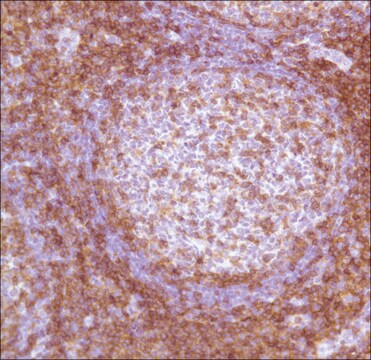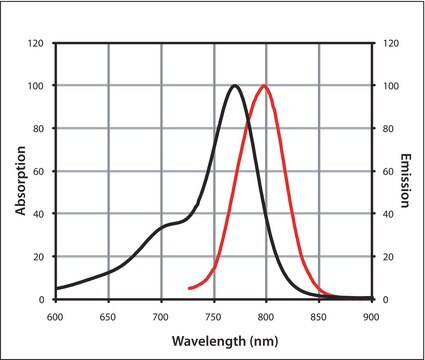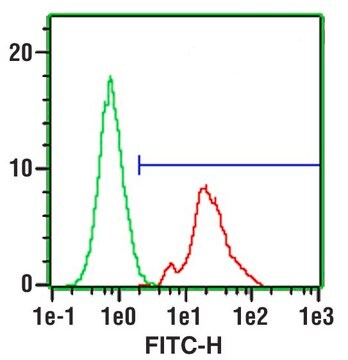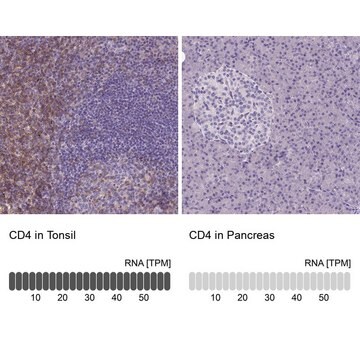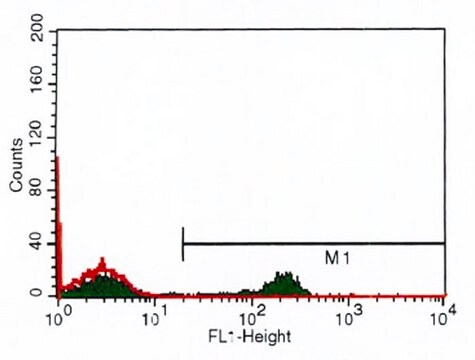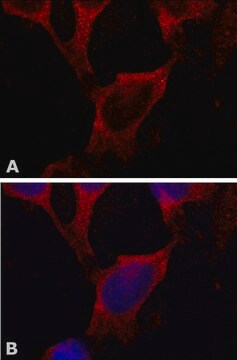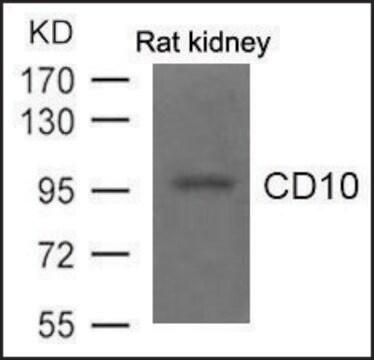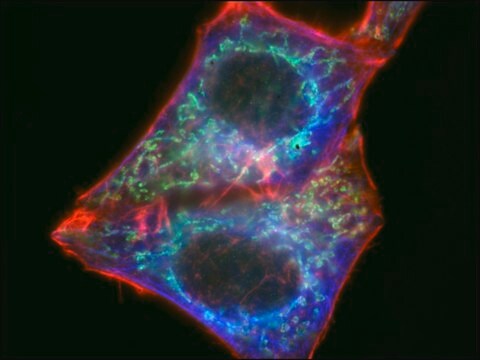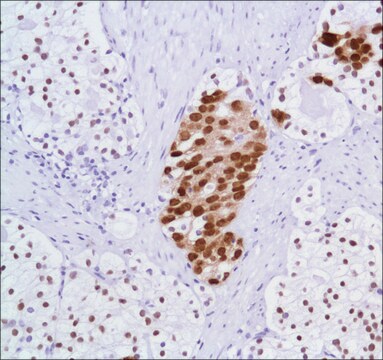SAB4700054
Monoclonal Anti-CD4 antibody produced in mouse
clone MEM-16, purified immunoglobulin, buffered aqueous solution
Sign Into View Organizational & Contract Pricing
All Photos(1)
About This Item
UNSPSC Code:
12352203
NACRES:
NA.41
Recommended Products
biological source
mouse
Quality Level
conjugate
unconjugated
antibody form
purified immunoglobulin
antibody product type
primary antibodies
clone
MEM-16, monoclonal
form
buffered aqueous solution
species reactivity
human
concentration
1 mg/mL
technique(s)
flow cytometry: suitable
isotype
IgM
NCBI accession no.
UniProt accession no.
shipped in
wet ice
storage temp.
2-8°C
target post-translational modification
unmodified
Gene Information
human ... CD4(920)
General description
The antibody MEM-16 recognizes an epitope EF loop of D1 domain of CD4 antigen, a 55 kDa transmebrane glycoprotein expressed on a subset of T lymphocytes (“helper“ T-cells) and also on monocytes, tissue macrophages and granulocytes.
Immunogen
HPB cell line (human peripheral blood leukemia T-cells)
Application
The reagent is designed for Flow Cytometry analysis of human blood cells using 10 μg/mL of sample.
Features and Benefits
Evaluate our antibodies with complete peace of mind. If the antibody does not perform in your application, we will issue a full credit or replacement antibody. Learn more.
Physical form
Solution in phosphate buffered saline, pH 7.4, with 15 mM sodium azide.
Disclaimer
Unless otherwise stated in our catalog or other company documentation accompanying the product(s), our products are intended for research use only and are not to be used for any other purpose, which includes but is not limited to, unauthorized commercial uses, in vitro diagnostic uses, ex vivo or in vivo therapeutic uses or any type of consumption or application to humans or animals.
Not finding the right product?
Try our Product Selector Tool.
Storage Class Code
10 - Combustible liquids
Flash Point(F)
Not applicable
Flash Point(C)
Not applicable
Choose from one of the most recent versions:
Certificates of Analysis (COA)
Lot/Batch Number
Don't see the Right Version?
If you require a particular version, you can look up a specific certificate by the Lot or Batch number.
Already Own This Product?
Find documentation for the products that you have recently purchased in the Document Library.
Zhi Liu et al.
Journal of immunology research, 2021, 2185568-2185568 (2021-11-13)
We recently showed that both nontypeable Haemophilus influenzae (NTHi) and its surface plasminogen- (Plg-) binding proteins interact with lipoprotein(a) (Lp(a)) in a lysine-dependent manner. Because Lp(a) can be taken up by macrophages, we postulated that it serves as an opsonin
Kouichi Furugaki et al.
PloS one, 9(7), e101854-e101854 (2014-07-12)
Polyplex micelles have demonstrated biocompatibility and achieve efficient gene transfection in vivo. Here, we investigated a polyplex micelle encapsulating genes encoding the tumor-associated antigen squamous cell carcinoma antigen recognized by T cells-3 (SART3), adjuvant CD40L, and granulocyte macrophage colony-stimulating factor
Chiuhui Mary Wang et al.
The EMBO journal, 33(12), 1354-1364 (2014-05-21)
Organization of immune responses requires exchange of information between cells. This is achieved through either direct cell-cell contacts and establishment of temporary synapses or the release of soluble factors, such as cytokines and chemokines. Here we show a novel form
C-H Chang et al.
Clinical and experimental immunology, 177(2), 373-380 (2014-02-20)
Although primary biliary cirrhosis (PBC) is considered a model autoimmune disease, it has not responded therapeutically to traditional immunosuppressive agents. In addition, PBC may recur following liver transplantation, despite the absence of major histocompatibility complex (MHC) matching, in sharp contrast
Koichi Iwanaga et al.
Cancer research, 74(11), 3011-3019 (2014-06-01)
Compared with prostaglandin E2, which has an established role in cancer, the role of the COX metabolite prostaglandin D2 (PGD2) in chronic inflammation leading to tumorigenesis is uncertain. In this study, we investigated the role of PGD2 in colitis and
Our team of scientists has experience in all areas of research including Life Science, Material Science, Chemical Synthesis, Chromatography, Analytical and many others.
Contact Technical Service